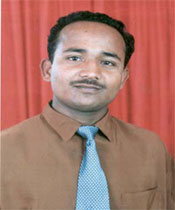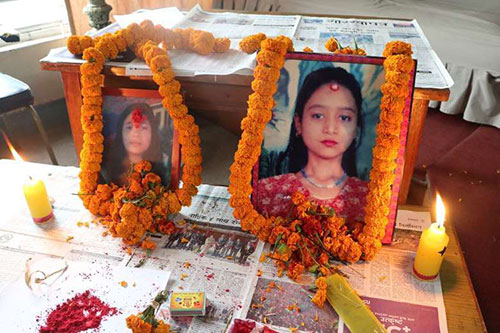Related Links
Case Updates
Krishna Adhikari
 On 6 June 2004, Krishna Prasad Adhikari, a resident of Fujel village of Gorkha District, was murdered in Chitwan District by Maoist cadres. Krishna Prasad was visiting his grandparents after having taken the SLC examinations, and he was abducted from Bakullahar Chowk by men who came on a motorcycle ...
On 6 June 2004, Krishna Prasad Adhikari, a resident of Fujel village of Gorkha District, was murdered in Chitwan District by Maoist cadres. Krishna Prasad was visiting his grandparents after having taken the SLC examinations, and he was abducted from Bakullahar Chowk by men who came on a motorcycle ... Maina Sunuwar
 Around 6 am on February 17, 2004, a group of RNA soldiers arrested Ms
Maina Sunuwar, a 15-year-old schoolgirl of Kharelthok VDC-6, Kavre
district. She disappeared since her arrest. Her family members, with
support from villagers and school where Maina was a student, visited
detention centers ...
Around 6 am on February 17, 2004, a group of RNA soldiers arrested Ms
Maina Sunuwar, a 15-year-old schoolgirl of Kharelthok VDC-6, Kavre
district. She disappeared since her arrest. Her family members, with
support from villagers and school where Maina was a student, visited
detention centers ... Sanjeev Kumar Karna
 Sanjeev Kumar Karna was one among the 11 persons arrested on October 8, 2003. On that fateful day, they had gone to attend a picnic program organized by the students at a place called Kariyachauri VDC-4, and from picnic, they went to Kataiya Chowri Area of Dhanusha district where they ate some food ...
Sanjeev Kumar Karna was one among the 11 persons arrested on October 8, 2003. On that fateful day, they had gone to attend a picnic program organized by the students at a place called Kariyachauri VDC-4, and from picnic, they went to Kataiya Chowri Area of Dhanusha district where they ate some food ... Arjun Bahadur Lama
Hari Prasad Bolakhe
Sarala Sapkota
Birendra Shah
Bishwanath Parajuli, Tom Nath Poudel and Dhan Bahadur Tamang
Chot Nath Ghimire and Shekhar Nath Ghimire
Bhauna Tharu
A tragic tale of two girls in the land of Buddha

In an international conference that I attended in May 2019, entitled “Enforced disappearances in Asia: Existing laws, challenges and way forward,” hundreds of victims expressed disappointment at the lack of outcomes in their incessant search for truth and justice. At the height of their emotions, victims expressed their anger over the absence of truth and justice in the presence of government representatives. It was but one of the many public events when victims vented their exasperation at the utter lack of truth and justice.
Devi Sunuwar, the mother of 15-year-old Maina Sunuwar who was victimized by enforced disappearance, torture and extrajudicial killing 17 years ago, is a person whose courage and persistence in finding truth and justice for her child is commendable. Having met her a few times, I admire her for her bravery in confronting threats and intimidation. She faces grave risks to her life so that what happened to her daughter and to many others will never be repeated.
“Every year we commemorate the death anniversary of my daughter and demand implementation of court orders. However, the government is not listening to our voices because the perpetrators are in power. So, I request the international community to intervene for the implementation of court orders,” said Devi, whose pain has been transformed into courage to attain the elusive justice not only for her daughter but also for thousands victims in this beautiful country.
Devi's ordeal is a story of love against cruelty. It is a fight for justice against the callousness of impunity. It is a struggle of memory against forgetting. It is a tale of two girls, close to her heart, who would now have been grown-up adults had the supposed protectors of the law not violently cut short their lives.
Maina Sunuwar, then brimming with life, was brutally plucked from the bosom of her family by the Royal Nepal Army (now Nepal Army) at the Birenda Peace Operation Training Center in Panchkal, Kavre, on Feb. 17, 2004.
In a testimony on Feb. 18, 2005, conducted by human rights organization Advocacy Forum, witness Bimala B.K. stated: "The soldiers asked me to show them Maina Sunuwar's house. I showed them the house. They arrested her. They then tied our hands behind our backs and loaded us into the vehicle. We were taken to Shanti Gate in Dhulikhel. Before taking us inside the camp, they blindfolded us.
“In the barracks, we were tied to separate trees and severely beaten. Maina was crying in pain. I was also crying. Perhaps she also heard me crying. After a couple of hours, I was taken to a room.”
This case is a microcosm of the systematic and massive violations of human rights in Nepal which, despite efforts to attain the elusive peace, remain unresolved. The history of Maina’s brutal killing could be traced back to the murder of another girl, Reena Rasaili, who was raped and killed by security forces in Kavre on Feb. 13, four days prior to the brutal killing of Maina. The murder of Maina was connected to the fact that her mother was a witness to the killing of Reena, Devi’s niece and Maina’s cousin.
In Reena’s case, despite many perpetrators, only Kaji Bahadur Karki, a junior non-commissioned officer who had already left the army, was arrested. He was eventually acquitted on the basis that guilt could not be proven beyond reasonable doubt. The shattered hopes of Reena’s family were further dashed when this sacrificial lamb was acquitted.
Miserably failing to obtain justice in the country where the crime was committed, Reena’s family brought the case before the UN Human Rights Committee, which, even without power to prosecute, imposes the sole sanction to shame states before the international community. Lamentably, though, shame is such a lonely word.
The enforced disappearance, torture and brutal killing of Maina Sunuwar and Reena Rasaili are among the thousands of unresolved human rights violations in Nepal, a state that has ratified most of the core international human rights treaties. These were perpetrated against the backdrop of enforced disappearances and several human rights violations in Nepal, traceable from 1951.
Human rights violations were on the rise during the Pancharayat era of 1981-89 and were perpetrated against those considered anti-monarchy. Even after the restoration of democracy, state and non-state actors committed serious human rights violations and abuses during the armed insurgency. The period from 1996 to 2006 witnessed the height of enforced disappearances in the country. These unresolved violations are a striking contrast to Nepal’s natural beauty in a country whose people’s poverty is exacerbated by violence.
In a press statement on the 17th anniversary of Maina's death, Advocacy Forum said: “After 13 years of relentless fight, on April 16, 2017, the Kavre District Court convicted three retired army officers in absentia for Maina’s murder, a crime that carries a sentence of life imprisonment in Nepal, whereas Captain Niranjan Basnet was acquitted. Against the decision, on September 1, 2017, the Nepal Army filed a writ petition at the Supreme Court arguing military jurisdiction on Maina’s case. Although the application should have been outrightly rejected at first glance, filing of a writ application of this nature is a deliberate attempt by the Nepal Army to deny and delay justice.”
In response to this glaring impunity, civil society organizations remain steadfast in accompanying victims in the search for truth and justice.
Attorney Mandira Sharma, whom I worked with for many years and who has been involved in the Maina Sunuwar case since the beginning, said: “At the moment when the Nepal Army has been claiming that the events of armed conflict need to be assessed in the light of military jurisdiction and shows reluctance to cooperate in Maina’s case, invoking the regular criminal justice system to investigate, prosecute and punish the perpetrators has opened doors for other victims of gross human rights violations during the conflict period to seek justice through the regular court system without having to be barred from the dysfunctional transitional justice mechanisms regardless.”
Against all odds, victims of human rights violations continue to demand truth and justice. Thus, after huge national and international pressure, the military held an internal inquiry into Maina’s case. A court martial in September 2005 ruled that her killing was accidental and sentenced three officers to six months' imprisonment for failing to follow proper procedures when disposing of her body. Colonel Bobby Khatri, Captain Sunil Prasad Adhikari and Amit Pun were also sentenced to suspension of promotions and a meager monetary fine as compensation to Maina's family, who refused to take it.
With courage, Devi Sunuwar, aware of the unlawful jurisdiction of the military court over non-military crimes, filed a mandamus at the Supreme Court challenging the non-action of the police and prosecutor and requested the court issue an order to complete the investigation under the regular criminal justice system. The Supreme Court, on Sept. 18, 2007, issued a mandamus order requiring the police to complete the criminal investigation within three months.
Almost two decades have passed. Justice remains elusive for Maina, for Reena and many other victims of human rights violations in Nepal, which boasts about its status as a member of the UN Human Rights Council.
Until when shall the victims wait?
Mary Aileen D. Bacalso is the president of the International Coalition Against Enforced Disappearances (ICAED). The views expressed in this article are those of the author and do not necessarily reflect the official editorial position of UCA News.
Source: https://www.ucanews.com/news/a-tragic-tale-of-two-girls-in-the-land-of-buddha/91541
























Join Us